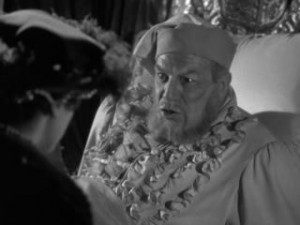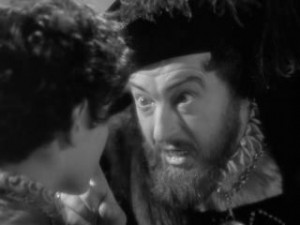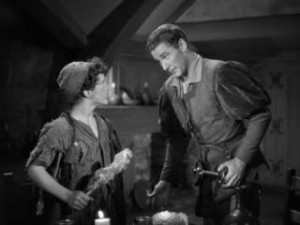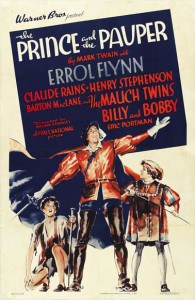This is not a history, but a tale of once upon a time. It may have happened. It may not have happened. But it could have happened.—the foreword to the film
After the big success of 1936 with The Charge of the Light Brigade—a more than respectable follow-up to 1935’s Captain Blood—the following year didn’t begin too auspiciously for Warner Bros.’s newcomer [intlink id=”34″ type=”category”]Errol Flynn[/intlink]. Green Light, with lackluster leading lady Anita Louise, was a saccharine overdose, and, at eighty-five minutes, grossly over-long, the actor struggling as best he could to be a noble surgeon. Another Dawn was pretty much the same story, an implausible love story, now with a betrayed husband thrown in for good measure. Kay Francis received top billing, and, at seventy-three minutes, it seemed even “longer” than Green Light. If only a marginal improvement over the previous two films, The Perfect Specimen closed 1937 with the actor’s comedy début. He did fairly well, nothing to brag about, though.
And, oh, yes, there was another film between Green Light and Another Dawn. And it, the best by far of 1937, was The Prince and the Pauper.
While receiving top billing, Flynn does not appear for almost an hour, and, in fact, he has fewer lines than some of his co-stars, certainly fewer than the Mauch twins, Bobby and Billy, who play the prince and the pauper, respectively. Just possibly, Montagu Love as Henry VIII, who is fifteenth in the cast listing, has the largest role in the film and, more likely, the biggest role of his sound era career, as he had been in the movies since 1914.
 In one of Love’s best scenes, he gives his son Edward some kingly—hardly kindly—advise: “Never trust so much, love so much, or need any one so much, that you can’t betray them with a smile.” Edward (later Edward VI) was one of the king’s two children; the other, a girl, would become Elizabeth I.
In one of Love’s best scenes, he gives his son Edward some kingly—hardly kindly—advise: “Never trust so much, love so much, or need any one so much, that you can’t betray them with a smile.” Edward (later Edward VI) was one of the king’s two children; the other, a girl, would become Elizabeth I.
The Prince and the Pauper is based, of course, on the Mark Twain novel about two look-alike boys who, as a game, switch places. Tom Canty, a boy from the London slums, is saved from a cruel Captain of the Guard (Alan Hale) by young Prince Edward. The prince has no pretensions and makes friends immediately with the beggar boy. They play games and exchange clothes, and when the prince goes outside Windsor Castle in his rags, he is mistaken by the captain for the beggar and chased into the streets.
 The real pauper is trapped now in the castle, and with his pleadings that he is only a beggar boy, is taken to be mad. When the ambitious Earl of Hertford (Claude Rains) discovers Tom’s true identity, he decides to use him toward his own ends and orders the Captain of the Guard to search for and kill the real future king. No one will ever know.
The real pauper is trapped now in the castle, and with his pleadings that he is only a beggar boy, is taken to be mad. When the ambitious Earl of Hertford (Claude Rains) discovers Tom’s true identity, he decides to use him toward his own ends and orders the Captain of the Guard to search for and kill the real future king. No one will ever know.
Meanwhile Edward is introduced to the ways of the average English citizen. He is abused by the father (Barton MacLane), and in Edward’s struggle for survival in this harsh new world, he learns the injustice of English Law. He is surprised by the poverty and can’t believe that there’s a tax on windows.
 The prince is rescued from a street brawl by a soldier of fortune, Miles Hendon (Flynn). After some adjustments between the two, mainly on Hendon’s part, the two become friends. Hendon, for instance, at first is not allowed to sit in the presence of the prince, then the boy relents and issues a decree that he and his heirs are forever allowed to sit in the presence of royalty. Hendon attributes the boy’s claim of being Prince Edward to madness.
The prince is rescued from a street brawl by a soldier of fortune, Miles Hendon (Flynn). After some adjustments between the two, mainly on Hendon’s part, the two become friends. Hendon, for instance, at first is not allowed to sit in the presence of the prince, then the boy relents and issues a decree that he and his heirs are forever allowed to sit in the presence of royalty. Hendon attributes the boy’s claim of being Prince Edward to madness.
